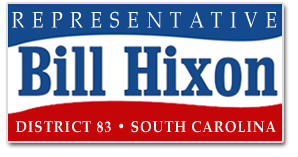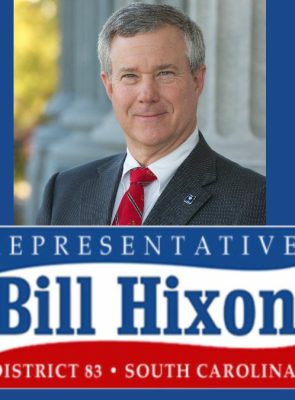SCE&G, Beachfront Management Reform Act, Six Days Until Sine Die
The South Carolina House declined to concur on Wednesday with a Senate bill that would not eliminate the full nuclear surcharge SCE&G customers are being forced to pay for the failed V.C. Summer nuclear project. The House and Governor Henry McMaster believe the 18% nuclear surcharge should be completely eliminated so ratepayers do not have to pay for a failed and fraudulent nuclear project. As of April 26th, SCE&G ratepayers have been forced to pay $2 billion for the V.C. Summer nuclear project. The Senate believes the 18% surcharge should but cut to 5%, which would still result in the collection of over $300,000 per month from ratepayers to SCE&G. Due to the House's action on Wednesday, the House and Senate will each select three members from its chambers to be on a joint conference committee that will negotiate a resolution to this bill. If the Senate refuses to work with the House and governor to provide temporary rate relief, ratepayers will be required to continue paying the 18% nuclear surcharge every month.
On Wednesday the House passed what is known as the Beachfront Management Reform Act to address the beachfront setback line. The beachfront setback line is set by the Department of Health and Environmental Control (DHEC) and it determines how close new construction can be built to the ocean. Data accumulated over a set period of time determines where the setback line will be for building construction. The time period in which data is collected to determine the setback line is referred to as the Establishment Cycle. The last line was set in 2012 and a 2017 line has been proposed. One major issue with the current parameters of the Establishment Cycle is the inclusion of major storms in the data, which skew the overall accumulated data, and drastically affect the placement of the line. The Beachfront Management Reform Act sets in place a beachfront setback line at the most seaward of the established 2012 line, or the line established through a review or appeal of the proposed 2017 line. The law also states data cannot be used to determine new lines from an erosion zone within eighteen months of it being impacted by a named storm system. Additionally, the law sets up procedures and notices for DHEC to use for any future baseline and setback line establishment cycles, including a clarification of an appeals process, and more transparency from DHEC.
As of Thursday afternoon, there are two legislative weeks/six legislative days remaining of this legislative session before Sine Die. The House will take up the final draft of the budget next week and vote on $26 million in additional funding for school resource officers and prison safety measures. Republicans are pushing for this funding to make our public schools safer for students and teachers.
HOUSE WEEK IN REVIEW
The House of Representatives took up the last in a series of bills drawing upon the work of the special House Utility Ratepayer Protection Committee which was appointed by the Speaker of the House following the announcement from Santee Cooper and SCANA's South Carolina Electric and Gas that construction on the V.C. Summer nuclear reactors in Fairfield County was being abandoned after billions of dollars in fees had been collected from South Carolina's ratepayers under the Baseload Review Act to support the failed nuclear power project.
The House amended, approved, and sent the Senate H.4376, a bill providing REFORM FOR SOUTH CAROLINA'S PUBLIC SERVICE AUTHORITY which governs the operations of the state-owned electric utility Santee Cooper. Terms of service are ended for the current PSA Board of Directors and a schedule is established for the appointment of their successors. All new board members must meet a set of qualifications to ensure that they possess certain levels of educational attainment and a background that affords expertise in: energy issues; water and wastewater issues; finance, economics, and statistics; accounting; engineering; or law. In making appointments to the authority, the Governor shall ensure that race, color, gender, national origin, and other demographic factors are considered to ensure the geographic and political balance of the appointments, and shall strive to ensure that the membership of the authority will represent, to the greatest extent possible, all segments of the population of the state. Members of the General Assembly and their immediate family may not be appointed to the Public Service Authority while serving as legislators and for four years after their service. The legislation creates a Rate Reduction and Stabilization Fund which must be used each year to stabilize or lower Public Service Authority electric rates and charges until the impacts of the PSA's interest in the failed V.C. Summer nuclear generating units are fully mitigated. All settlement money relating to the abandoned nuclear project that the PSA receives from the Toshiba Corporation must be deposited in the Rate Reduction and Stabilization Fund and the fund much receive each year's PSA surplus funds until harms are mitigated. The legislation creates a nine-member Santee Cooper Evaluation and Recommendation Committee composed of key legislative leaders, or their designees, the Governor, or his designee, and two gubernatorial appointments from the state at large. This committee is charged with making a comprehensive examination and producing recommendations on such issues as: the manner in which the General Assembly may best protect ratepayers and taxpayers in regard to Santee Cooper; alternative governance structures for Santee Cooper; whether Santee Cooper should be subject to oversight by the Public Service Commission or Joint Bond Review Committee; an evaluation of the electric cooperative structure, including the role of the Central Electric Power Cooperative; a valuation of Santee Cooper's assets and an assessment of its debt; and, whether selling Santee Cooper is in the best interests of South Carolina taxpayers, the ratepayers of Santee Cooper, and the Ratepayers of the Electric Cooperatives of South Carolina.
 The House voted to continue H.5045, a bill REVISING PROVISIONS FOR SOLAR POWER AND OTHER DISTRIBUTED ENERGY RESOURCES and net-metering provisions for the electrical power they generate which were approved by the General Assembly in Act 236 of 2014.
The House voted to continue H.5045, a bill REVISING PROVISIONS FOR SOLAR POWER AND OTHER DISTRIBUTED ENERGY RESOURCES and net-metering provisions for the electrical power they generate which were approved by the General Assembly in Act 236 of 2014.
The House concurred in Senate amendments to H.3591, a bill REAUTHORIZING SOUTH CAROLINA FIRST STEPS TO SCHOOL READINESS and making revisions and updates to this program for providing enhanced early childhood development, education, and family support services to enable children to reach school ready to achieve academic success. The legislation extends the program's sunset date by providing that the First Steps to School Readiness Act is reauthorized until June 30, 2025. The legislation makes provisions for First Steps to be reviewed by a joint House and Senate committee if the program has not already been subjected to a periodic review by the House and Senate Legislative Oversight Committees. The legislation enhances accountability and reporting requirements for evaluating program cost and effectiveness, including additional requirements for documenting progress toward improving kindergarten readiness and a requirement for the Office of South Carolina First Steps to publish each local partnership's comprehensive plan and annual report on the office's website. Under the legislation, the salary of the Executive Director of the South Carolina Office of First Steps becomes subject to the authority of the Agency Head Salary Commission. The legislation was enrolled for ratification.
 The House amended, approved, and sent the Senate H.4701, the "B.P. ACT" which makes revisions relating to current bullying prohibition policies adopted by school districts, so as to provide procedures for responding to and remediating allegations of bullying, and to require an appeals procedure. The bill adds additional requirements for investigating, reporting, and remedying bullying. Among the new requirements are the following: when bullying is reported to a school, the principal or superintendent designee must investigate the incident, maintain written documentation of the allegations and investigations, and report findings to the district superintendent; parents or guardians of both the bully and the student being bullied must be notified of the incident; the school must provide information regarding actions being taken to protect the aggrieved student, prevent future occurrences, and the findings of the investigation; and the school must develop procedures for remediation that identify the specific nature of the incident and outline a graduated series of consequences for the student who committed the bullying. Alternative discipline measures that may be used to address bullying behavior include parent/guardian meetings, reflective activities, mediation, counseling, anger management, skills building, community service, and in-school detention. The policy must include ways to remediate the incident of bullying to counter negative impacts and reduce the risk of future occurrences.
The House amended, approved, and sent the Senate H.4701, the "B.P. ACT" which makes revisions relating to current bullying prohibition policies adopted by school districts, so as to provide procedures for responding to and remediating allegations of bullying, and to require an appeals procedure. The bill adds additional requirements for investigating, reporting, and remedying bullying. Among the new requirements are the following: when bullying is reported to a school, the principal or superintendent designee must investigate the incident, maintain written documentation of the allegations and investigations, and report findings to the district superintendent; parents or guardians of both the bully and the student being bullied must be notified of the incident; the school must provide information regarding actions being taken to protect the aggrieved student, prevent future occurrences, and the findings of the investigation; and the school must develop procedures for remediation that identify the specific nature of the incident and outline a graduated series of consequences for the student who committed the bullying. Alternative discipline measures that may be used to address bullying behavior include parent/guardian meetings, reflective activities, mediation, counseling, anger management, skills building, community service, and in-school detention. The policy must include ways to remediate the incident of bullying to counter negative impacts and reduce the risk of future occurrences.The House amended, approved, and sent the Senate H.3208, a bill establishing CRIMINAL OFFENSES OF FURTHERING TERRORISM. The legislation establishes the felony offense of furthering terrorism that applies to someone who makes significant plans or takes actions toward the commission of an act of violence with the intent to commit an act of terrorism. A violator is subject to imprisonment for up to thirty years. The legislation also establishes a felony offense that applies to someone who provides material or financial support of an act of terrorism or who conceals the actions or plans of another to carry out an act of terrorism. A violator is subject to imprisonment for up to twenty years. The legislation authorizes the seizure and forfeiture of real and personal property used in connection with these offenses.
The House amended, approved, and sent the Senate H.4304, a bill facilitating OFFSHORE WIND-RESOURCE DEVELOPMENT ACTIVITIES undertaken by an electrical utilities. The legislation authorizes the South Carolina Public Service Commission to adopt procedures that encourage electrical utilities, subject to the jurisdiction of the commission, to invest in offshore wind-resource development activities if the commission determines that adopting these procedures would be in the best interest of South Carolina ratepayers in terms of reduced electric rates, economic development benefits for state residents, and environmental impacts. Any wind-resource structure installed must not be visible by the human eye from land.
The House amended, approved, and sent the Senate H.4093, the "EMPLOYMENT FIRST INITIATIVE ACT". The legislation directs all of South Carolina's state agencies and political subdivisions to consider adopting a policy that encourages competitive integrated employment for individuals with disabilities. To further those employment goals, state agencies and local governments are encouraged to coordinate their efforts, adopt rules and promulgate regulations for implementation, and share data and information across systems in order to track the progress of the initiative. A seventeen-member South Carolina Employment First Oversight Commission is created to coordinate the implementation of the initiative and make annual progress reports to the Governor and members of the General Assembly.
The House amended, approved, and sent the Senate H.3775, a bill AFFORDING THOSE WHO HAVE BEEN ADOPTED GREATER ACCESS TO MEDICAL INFORMATION AND OTHER RECORDS. The legislation establishes a protocol that allows a person twenty-one years of age or older who was born in the state of South Carolina and who has had his original certificate of birth sealed due to an adoption to, upon written request to the state registrar, receive a copy of his original birth certificate and any evidence of the adoption held with the original record if the biological parent has completed a form consenting to the release of the original birth certificate. The form also must allow for the biological parent to indicate contact preference and to consent to release of medical history. The contact preference form and medical history form are private communications from the biological parent to the adoptee named on the sealed birth certificate. The copy of the original birth certificate must be in a form that clearly indicates it is not a certified copy and that it may not be used for legal purposes.
The House approved and sent the Senate H.4698. In order to attract needed professionals, this bill provides an EXEMPTION FOR LICENSED PHYSICIANS EMPLOYED WITH THE DISABILITY DETERMINATION SERVICES UNIT of the State Agency of Vocational Rehabilitation from additional examination requirements with the State Board of Medical Examiners.
The House approved and sent the Senate H.4935, a joint resolution creating a temporary "SOUTH CAROLINA PALLIATIVE CARE AND QUALITY OF LIFE STUDY COMMITTEE" to consult with and advise the Division on Aging in an assessment of this state's palliative care initiatives which involve improving the quality of life of patients and their families facing the issues associated with chronic life-threatening illness, through the prevention and relief of suffering by means of early identification and assessment, reduced hospital readmissions and treatment of pain and other conditions associated with chronic illness, including physical, psychosocial, and spiritual. The legislation provides for the committee's membership and requires a report of its findings and recommendations to be submitted to the General Assembly and the Governor by December 31, 2019.
The House approved and sent the Senate H.5027, a bill which provides that suspension of a person's driver's license for failure to pay a traffic ticket shall not constitute a conviction of an offense that would result in the person being considered an HABITUAL OFFENDER.
The House approved S.499, legislation ELIMINATING THE FEE FOR PLACING THE VIOLENT CRIME OFFENDER DESIGNATION ON A DRIVER'S LICENSE, and enrolled the bill for ratification. While the fifty dollar fee is eliminated, the Department of Motor Vehicles is still required to place the identifying code on the driver's license of someone who has been convicted of, or pled no contest to, a crime of violence, defined as murder, manslaughter (except negligent manslaughter arising out of traffic accidents), rape, mayhem, kidnapping, burglary, robbery, housebreaking, assault with intent to kill, commit rape, or rob, assault with a dangerous weapon, or assault with intent to commit any offense punishable by imprisonment for more than one year.c
The House amended, approved, and sent the Senate H.4403, a bill establishing an ADDITIONAL METHOD OF POSTING NOTICE OF TRESPASSING on a property. As an alternative to the posting of'No Trespassing' signs, the legislation establishes a procedure that allows trespassing notice to be posted on tracts of land by marking immovable, permanent objects along the boundary lines with purple paint.
 The House amended, approved, and sent the Senate H.3896, a bill AUTHORIZING COUNTY ORDINANCES REQUIRING THAT PROPERTY BE KEPT CLEAN and free of rubbish. The legislation provides authorization for a county to provide by ordinance that the owner of a lot or property in the county, whether residential or commercial, shall keep that lot or property clean and free of rubbish, debris, and other unhealthy conditions that constitute a public nuisance. Exemptions are provided that address agricultural, historically significant, and archaeologically significant properties and properties with material remains of past human life.
The House amended, approved, and sent the Senate H.3896, a bill AUTHORIZING COUNTY ORDINANCES REQUIRING THAT PROPERTY BE KEPT CLEAN and free of rubbish. The legislation provides authorization for a county to provide by ordinance that the owner of a lot or property in the county, whether residential or commercial, shall keep that lot or property clean and free of rubbish, debris, and other unhealthy conditions that constitute a public nuisance. Exemptions are provided that address agricultural, historically significant, and archaeologically significant properties and properties with material remains of past human life.The House amended, approved, and sent the Senate H.4466, a bill addressing LOCAL GOVERNMENT REGULATION OF THE OPERATION OF CERTAIN RENTAL VEHICLES such as golf carts and mopeds. The legislation provides authorization for counties and municipalities to adopt ordinances that regulate the operation of certain vehicles upon the public streets and highways within its jurisdiction when the vehicles are offered to the public for rental on a daily, weekly, or monthly basis. Ordinances are limited to the use of safety devices and the geographic area, distance, identification of the vehicles, and specified public roadways on which these rented or leased vehicles may operate.
The House approved and sent the Senate H.5046, a bill establishing a one-month GRACE PERIOD FOR RENEWING REAL ESTATE LICENSES and paying renewal fees without incurring a late fee or engaging in the unlicensed practice of real estate.
The House amended, approved, and sent the Senate H.3846, a bill that revises EXCEPTIONS FROM HOMEBUILDER AND RESIDENTIAL CONTRACTOR LICENSURE REQUIREMENTS to exempt an owner of residential property who makes certain comparatively minor home improvements and repairs so long as the owner does the work himself. A residential property owner is exempt from building permit application requirements for these improvements if he performs the work himself. The legislation also specifies that a licensed residential builder may also obtain licensure as a residential specialty contractor.
The House amended, approved, and sent the Senate H.4021, a bill addressing PERISHABLE PREPARED FOOD MANUFACTURING SALES TAX EXEMPTIONS. The legislation makes provision for statesales tax exemptions that apply to certain fuel and electricity used in perishable prepared food manufacturing and certain clothing worn at perishable prepared food manufacturing facilities.
The House approved and sent the Senate to H.5152, a bill revising requirements for the IDENTIFICATION TAGS PLACED ON COTTON BALES STORED IN A WAREHOUSE OPERATED UNDER THE STATE WAREHOUSE SYSTEM. The legislation provides that the system may utilize the Permanent Bale Identification (PBI) number and tag of another gin if the tag meets the requirements. However, if the PBI tag does not meet the requirements, a sticker maybe affixed to the PBI tag or bale of cotton adjacent to the PBI tag that meets these requirements.
The House amended, approved, and sent the Senate H.4973, a bill revising provisions governing the issuance by the Department of Motor Vehicles of SPECIAL LICENSE PLATES FOR CERTAIN RETIRED PUBLIC OFFICIALS. The legislation allows a former member of the General Assembly to be issued a second special license plate. The legislation includes provisions that disallow these special plates for someone who has been convicted of a crime involving dishonesty or moral turpitude, or another crime punishable by imprisonment for at least one year.
The House amended, approved, and sent the Senate H.4851, a bill that implements recommendations arising from the House Legislative Oversight Committee's study of the DEPARTMENT OF ARCHIVES AND HISTORY which codify budget provisos and make revisions regarding the use of certain department proceeds.
The House approved and sent the Senate H.5063, a bill that implements recommendations arising from the House Legislative Oversight Committee's study of the Department of Agriculture. The legislation eliminates outdated references to the department's role in regulating HOME-BASED FOOD PRODUCTION OPERATIONS which are now supervised by the Department of Health and Environmental Control.
The House approved S.1038 and enrolled the bill for ratification. The legislation provides that, for any county which began the REIMPOSITION OF A CAPITAL PROJECTS SALES TAX on April 1, 2013, and reimposed the tax at the 2016 General Election, the reimposed tax that commenced on April 1, 2013, is extended until April 30, 2020, and the commencement of the tax that was reimposed at the 2016 General Election is delayed until May 1, 2020, and expires on April 30, 2027.
The House rejected H.4836, a bill directing the timely REPAIR OF PUBLIC ROADS AND HIGHWAYS RUNNING ATOP DAMS THAT FAILED DURING THE OCTOBER 2015 FLOODS.
The House of Representatives amended, approved, and sent the Senate H.4496, a bill ENHANCING SOUTH CAROLINA'S LAWS PROHIBITING SANCTUARY CITIESthat disallow the adoption of ordinances and policies by municipalities and other local governments to prohibit, restrict, or interfere with the enforcement of immigration laws. The legislation authorizes the Attorney General, in addition to a resident of a political subdivision, to bring a civil action in the circuit court against a political subdivision that adopts ordinances or policies to restrict law enforcement officers, local officials, or local government employees from enforcing immigration provisions, limit communications with federal or state officials regarding someone's immigration status, or establish work authorization provisions that conflict with federal or state law. If a court finds that a political subdivision has violated provisions that prohibit interference with the enforcement of immigration laws, the political subdivision is not allowed to receive Local Government Fund appropriations for at least the next three consecutive fiscal budget years.
The House adopted the conference committee report on H.3698, a bill revising fishing seasons and catch limits for STRIPED BASS. The legislation also includes a definition of the geographic boundaries for the Intracoastal Waterway in Horry County within a statutory provision that establishes geographic boundaries for bodies of water in the state. The Senate having also adopted the report, the bill was enrolled for ratification.
The House appointed a conference committee to address its differences with the Senate on H.4612, legislation authorizing SURETY BONDS FOR GENERAL AND MECHANICAL LICENSURE APPLICANTS.
The House amended Senate amendments to H.3819, a bill establishing new REQUIREMENTS THAT MUST BE MET BEFORE PRESCRIBING OPIOID ANALGESICS TO MINORS, and returned the legislation to the Senate.




